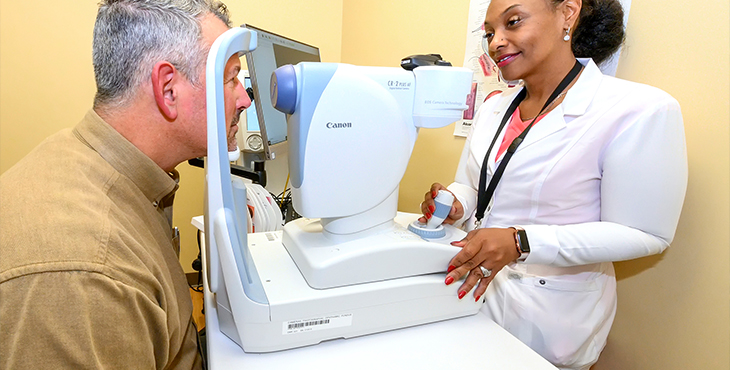In 2015, VA launched the Technology-based Eye Care Services program, or TECS. The tele-eye screening program now serves 22 VA facilities across the country.
TECS brings remote eye screening services to rural or underserved Veterans who might otherwise have limited access to a screening eye exam or new glasses. It is not intended to replace an in-person eye exam and is one of several options that Veterans can choose for their eye care.
Researchers study possible enhancements
VA’s Dr. April Maa and coauthors recently published a study that tested the impact of adding of a special imaging test to the TECS screening exam. They found that adding optical coherence tomography (OCT) did not improve remote providers’ accuracy in detecting glaucoma or retinal disease.
The researchers recommend further study. They believe OCT results might change with remote glaucoma or retinal specialists who are well-versed in reading OCT images.
Maa is the clinical director for regional telehealth services in VISN 7 Center, and section chief for TECS. The ophthalmologist divides her time among treating eye disease and performing surgery, helping Veterans preserve their vision, and training ophthalmology residents. TECS is her brainchild.
Maa and her team saw a need for tele-eye services within the VISN 7 catchment area, which includes many rural communities in Alabama and Georgia. She says that prior to TECS, Veterans at the Atlanta VA had long waits to see an eye doctor.
Passionate about eliminating disparities
“My entire team is passionate about health care disparities. Just because you live in [rural] Blairsville, Georgia, doesn’t mean you should get less care than other people,” says Maa. “Those system-based barriers are reduced with telemedicine. We can bring the patient a huge amount of subspecialty care that they might not otherwise have access to.”
In TECS, technicians see patients at their primary care clinic. They gather a medical history, take vision measurements, and conduct a manifest refraction test. That test measures nearsightedness, farsightedness, and astigmatism.
In the photo above, Nguyen Walker demonstrates the use of a digital retinal camera—an important part of remote eye screening—with Army Veteran Bill Beverley-Blanco (Photo by Lisa Pessin).
The technicians also measure eye pressure and photograph the retina. Once the visit is complete, the patient’s data and photographs are shared with a remote eye specialist. The specialist reviews the results, makes referrals, and prescribes eyeglasses or medication, if necessary.
Recommendation: Alternate with in-person exams
If patients need a follow-up visit, they receive a call from the provider. If everything is good, the patient receives a notice informing them of their results. Maa says the TECS screening should be alternated with regular in-person eye exams.
She says both rural Veterans and their health care providers value TECS.
“The patients love it and the primary care providers appreciate having eye services at the primary care clinic. We have been able to pick up a lot of very serious eye disease in our Veterans to prevent blindness and get them timely access to care.”
Read about other vision research on the VA research website.
Topics in this story
More Stories
In a new series that highlights advancements in VA health care, VA researchers and clinicians are appearing on a Veteran-themed media platform—Wreaths Across America Radio—to tout their critical work.
Recently published findings from the VA Disrupted Care National Project […]
Diverse representation of women in health care research allows MVP to make discoveries for women’s health








This program seems to be very beneficial to both Veterans, and the VA. Congratulations to Dr. Maa and her Associates for a job well done.
Thank you and yes, as the results show, the TECS program is immensely beneficial to our Veterans across the board.